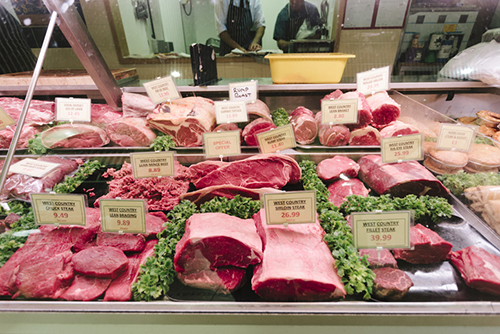‘Lukewarmer’ promotes discredited claim about emissions from meat

Self-styled ‘lukewarmer’ Viscount Ridley is continuing to promote false and debunked claims about the amount of greenhouse gases that are due to the consumption of meat.
Last Friday, 5 February 2021, he was interviewed on Talk Radio about the potential application of carbon pricing to meat products, during which he said, “Meat’s interesting because if we all gave up meat altogether we would save 4 per cent of emissions, that’s all the effect it would have … That’s based on a meta-analysis of studies all across the world to try and understand it… The argument that meat is a cause of emissions is very misleading, I’m afraid.” These statements were inaccurate and misleading, but the interviewer, Julia Hartley-Brewer, failed to challenge them.
Viscount Ridley doubled down later that same day with the following tweet: “A recent ‘meta-analysis’ of all the peer-reviewed papers on this topic found that giving up meat altogether would cut individuals’ total emissions by just 4.3 per cent.” He drew this quote from a corrected version of an old article he had written which was published in The Sunday Telegraph on 11 August 2019 under the headline: ‘The War on Meat has begun, and there are many reasons to join the resistance’. When it was first published, the Sunday Telegraph article stated that, “A recent ‘meta-analysis’ of all the peer-reviewed papers on this topic found that if the average Westerner gave up meat altogether it would cut their total emissions by just 4.3 per cent.”
Although Viscount Ridley did not name the study he was citing, it is clear that he was not referring to the most up-to-date and comprehensive review of the literature on this topic, which is by the Intergovernmental Panel on Climate Change (IPCC) – a report named ‘Climate Change and Land’, published on 8 August 2019, three days before his article appeared in The Sunday Telegraph. Figure 5.12 in the IPCC’s report shows that the average figure from the literature for the reduction in global greenhouse gas emissions from a vegetarian diet is almost 6 billion tonnes by 2050. This would represent about 10 per cent of the 59.1 billion tonnes of greenhouse gases that were emitted in 2019, according to the most recent estimate by the United Nations Environment Programme.
As it turns out, Viscount Ridley was referring indirectly to a paper titled ‘Environmental impact of dietary change: a systematic review’, by Dr Elinor Hallström and co-authors. The paper was published online by the Journal of Cleaner Production on 14 December 2014. That study reviewed 14 peer-reviewed journal articles which assessed the greenhouse gas emissions in a total of 49 different dietary scenarios. It concluded: “The results suggest that dietary change, in areas with affluent diet, could play an important role in reaching environmental goals, with up to 50% potential to reduce GHG [greenhouse gas] emissions and land use demand associated with the current diet.” Significantly, nowhere does the study indicate that adopting a meat-free diet would reduce an individual’s emissions by 4.3 per cent.
So where did that number come from? It was actually plagiarised by Viscount Ridley from an error-filled newspaper article by Dr Bjorn Lomborg which was published in The New York Post on 22 October 2018 under the headline ‘No, giving up burgers won’t actually save the planet’. The article stated: “Anyway, a systematic peer review of studies shows vegetarian diets likely reduce an individual’s emissions by the equivalent of 540 kg (1,190 lbs.) of CO2. For the average person in the industrialized world, that’s the equivalent of cutting emissions by just 4.3 percent.”
Dr Lomborg revealed in a tweet the previous day how he had invented the figure. He had drawn the source of the figure of 540 kilogrammes of carbon-dioxide-equivalent from the study by Dr Hallström and colleagues. Dr Lomborg also assumed that the average per-capita emissions for the OECD countries was 12.5 tonnes per year of carbon-dioxide-equivalent. However, closer scrutiny of the paper by Dr Hallström and co-authors shows that the 540 kilogramme figure was derived from just seven dietary scenarios: four from the UK, one from the Netherlands, one from Germany and one from India. Therefore it is not representative of the OECD, the ‘industrialised world’, or ‘Western countries’. In particular, it does not include the potential impact of the adoption of vegetarian diets by North American meat-eaters.
Nevertheless, Viscount Ridley continues to promote the false figure. His flurry of social media posts on 5 February included another tweet stating: “A meta-analysis found that vegetarianism would reduce emissions by 540kg per head, which is 4.3% of an average westerner’s emissions.”
The truth is that Viscount Ridley, who is a member of the ‘Academic Advisory Council’ of the Global Warming Policy Foundation, knows that these claims are false. When his article in The Sunday Telegraph was first published, I complained to the Independent Press Standards Organisation (IPSO) that it was inaccurate and misleading, and therefore breached the Editors’ Code of Practice. After a long drawn-out investigation, IPSO ruled that Viscount Ridley was allowed to use the plagiarised figure of 4.3 per cent but was wrong to link it directly to western diets. The online version of the article was amended accordingly.
Yet Viscount Ridley, a hereditary peer who sits on the Conservative benches in the House of Lords, continues to promote this falsehood and complains whenever he is challenged about it.

